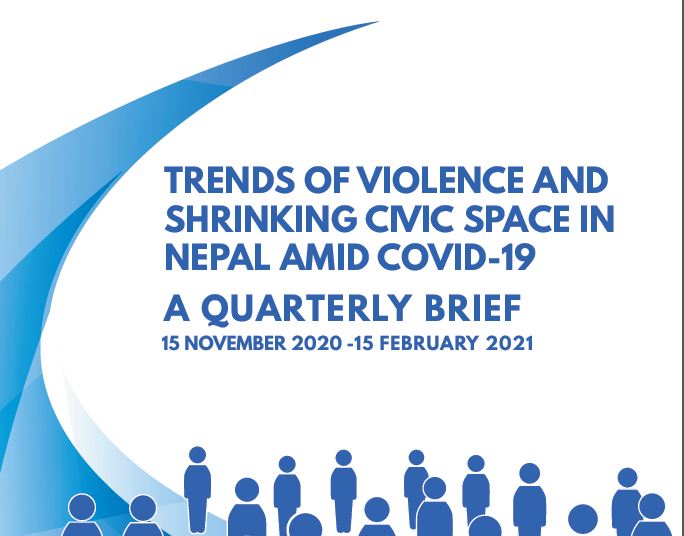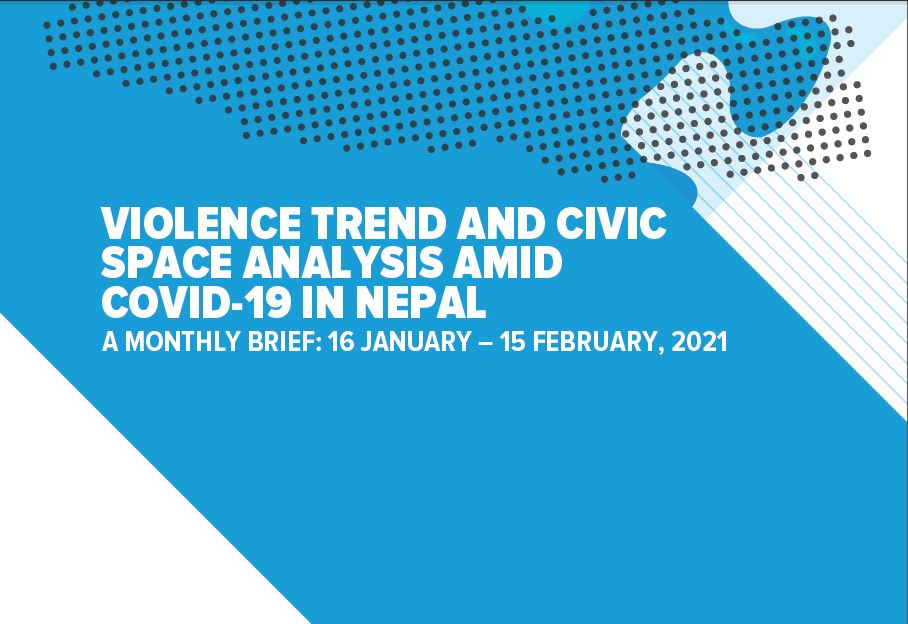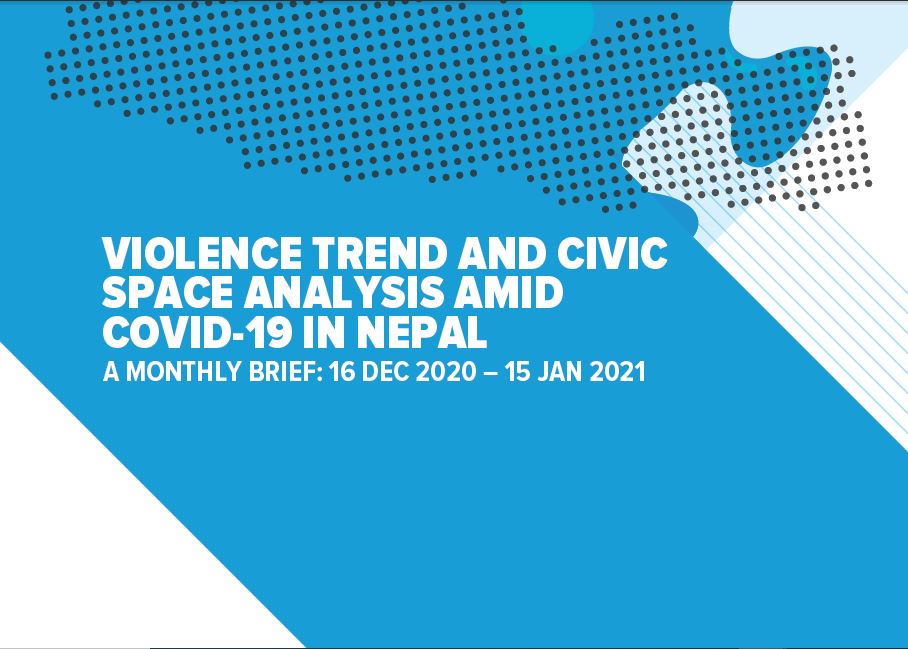Incident Reports
Rapper’s arrest is latest in government’s attempt to crack down on free expression
2019-10-25
With two musicians taken into police custody in the past week alone, rights activists believe that the government is increasingly cracking down on the right to expression, a freedom guaranteed by the constitution.
On Thursday, the Metropolitan Crime Division took rapper Samir Ghising, popularly known as Vten, into custody on charges of promoting “values that go against social norms” through his songs. Ghising’s arrest came just days after police arrested another singer, Durgesh Thapa, for allegedly promoting similar “anti-social values” in his recent song.
According to police, both Ghising and Thapa were arrested for advocating for anti-social activities like marijuana use and alcohol consumption. Anyone who instigates others to commit illegal activities—in this case, smoke marijuana—can be taken into custody, said police.
“In his rap song, he had used inappropriate words which could have a negative influence on society. So we arrested him after receiving a directive from the Central Investigation Bureau,” said Superintendent Durga Singh, spokesperson at the Lalitpur Metropolitan Police Range.
Ghising had become a cultural sensation after the release of his song, ‘Hami yestai ta ho ni bro’. The song, whose title has entered common parlance, has been viewed over 19 million times on Youtube since its release four months ago. Two hours after his arrest, the song was taken off his Youtube channel.
Thapa too is a popular singer, known most recently for his song, ‘Bichha bichha ma’. While Ghising remained in custody as of press time, Thapa was released after he publicly apologised and said that he would remove objectionable content from his songs, particularly ‘Happy Tihar’ which promoted drinking and marijuana, according to police.
“They threatened me to keep in custody so I apologised and vowed to take down the song,” Thapa told the Post. “All I did was use the phrase ‘chiso beer’ [cold beer] which everyone wants to drink in a festive mood. When the government starts arresting artists for portraying society, this is definitely a significant restriction.”
According to lawyers and activists, the police’s arrest of popular singers for violating ‘social standards’ is an exercise in moral policing and has little to do with actual security.
“Government and the police shouldn’t be setting or dictating society’s value systems. That is decided by society itself. Pop songs and satire are a reflection of society adapting to the changes we are going through,” said Babu Ram Aryal, a lawyer who specialises in cyber law. “If we keep quiet during single arrests like these, it will contribute to setting a precedent, where people will continue to get rounded up by the police for expressing their opinions.”
These increasing arrests reflect how the current government is no longer hiding its autocratic streak, said Aryal. The Nepal Communist Party government has been widely criticised for a number of bills—including the Media Council bill and the Information Technology bill—that critics say could be employed to curtail freedom of speech and freedom of the press. Earlier this month, Nepali citizens were detained by police during Chinese President Xi Jinping’s visit for wearing clothes and carrying bags with Tibetan signage.
When Gokul Baskota, government spokesperson and Minister of Communication, was asked about the recent arrests at a weekly press conference on Thursday, he defended the authorities’ action.
“We’ve never said you cannot sing, but can you listen to that song with your family without feeling uncomfortable? We can’t encourage those who make the mistake of trying to destroy the foundation of our society’s values,” said Baskota. “We aren’t trying to dictate what people should do, all we are asking them as Nepali citizens is to protect our value system.”
Earlier in February, singer Pashupati Sharma was threatened by the sister organisation of the ruling Nepal Communist Party for his song, ‘Lootna sakey loot’, which was a satirical take on the corruption prevalent in Nepal’s public sector. The song, which had received an overwhelmingly positive response from listeners on social media and other platforms, was pulled from Youtube just 48 hours after its release.
Police should not be able to dictate what musicians can sing about, as that is part of artists’ freedom of expression, say other musicians.
“Artists are a reflection of society. People could relate to VTEN’s lyrics because that’s how our society is,” said Rohit Shakya, an artist and music producer. “Such restrictions will only bring about negative effects and hurdles in the art community.”
Others pointed out that Vten is a rapper and rap as a genre of music has a long history of rebellion and confronting authority.
“Rap is the kind of genre where one can freely express themselves,” said Kolin Bikram Rana, CEO of Raw Barz, an entertainment company that hosts rap battles. “If the Nepali government can’t adapt to this genre then they’re not only depriving us of our rights but are also insulting a global movement.”
But rappers also need to be careful, he said. Musicians shouldn’t knowingly insult or disparage an entire community.
“One should have the right to express oneself but that doesn’t give them a pass to say anything without realising the consequences,” said Rana.
What is particularly worrying to many privacy advocates is that the Nepal Police seems to be going through public social media pages to find content that they deem “harmful.”
“No one filed a complaint against Vten or his song,” said Superintendent Singh of the Lalitpur Metropolitan Police Range. According to Singh, the Central Investigation Bureau came across the song and issued an order to the Lalitpur Police to take Ghising into custody.
“The police are responsible for peace and security in society and we want to make sure that no one is damaging the religious, cultural or traditional harmony of society,” Deputy Inspector General Bishwaraj Pokharel, Nepal Police spokesperson, told the Post. “Everyone must be aware of and responsible for that.”
Shuvam Dhungana, Anup Ojha and Abani Malla contributed to this report.
Related Reports
Human Rights / Mahottari
Woman subjected to assault and inhumane treatment on witchcraft allegation in Mahottari
Human Rights / Sankhuwasabha
Two killed in prison in Sankhuwasabha: Seven inmates taken into custody for investigation
Interpersonal Violence / Kanchanpur
Inmate being subjected to physical assault and threat in prison accuses family members
Human Rights / Bara
Woman subjected to assault and inhumane treatment on witch craft allegation in Bara
Related Trend Analysis
Analysis

THE NEPAL PEACE MONITOR ANNUAL REVIEW: 2020
October 25, 2021
Human Trafficking / LGBT+ Rights / GBV / Political / Children’s Rights / Senior Citizens’ Rights / HRD Issues / Human Rights / Interpersonal Violence / Governance / Covid-19 / Civic-Space / PwD
Analysis

COCAP BIWEEKLY: INCIDENTS SURROUNDING COVID-19 January 16 - 31, 2021
February 04, 2021
GBV / Human Rights / Governance / Covid-19
Analysis

COCAP BIWEEKLY: INCIDENTS SURROUNDING COVID-19 January 1 - 15, 2021
January 21, 2021
GBV / Human Rights / Governance / Covid-19




